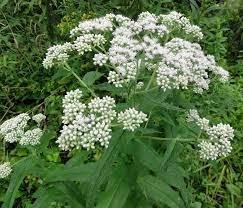Eupatorium Perfoliatum: Exploring Its Traditional Use in Dengue Fever Management


Introduction:
Eupatorium perfoliatum, commonly known as Boneset, emerges from the annals of traditional medicine with a historical reputation for its role in managing fevers, including those associated with conditions like dengue fever. This native North American perennial, belonging to the Asteraceae family, has garnered attention for its potential febrifuge properties and immune-boosting effects. In this exploration, we will delve into the historical use, potential benefits, and considerations surrounding Eupatorium perfoliatum in the context of dengue fever. Quackgrass
Botanical Background: Boneset is characterized by its whorled leaves, arranged in a distinctive manner around the stem, giving rise to its name "perfoliatum." The plant's historical use in traditional medicine stems from indigenous knowledge passed down through generations and later adopted by early European settlers.
Traditional Use in Fevers:
-
Fever-Reducing Properties: Eupatorium perfoliatum gained prominence for its purported ability to reduce fevers. Traditional herbalists believed that the plant, when prepared as infusions or decoctions, could induce sweating and help break fevers associated with various illnesses, including influenza.
-
Immune System Support: Beyond its febrifuge properties, Boneset was traditionally valued as an immune system tonic. It was believed to contribute to overall health and resilience, particularly during times of seasonal challenges.
Eupatorium Perfoliatum and Dengue Fever:
-
Historical Use: In certain traditional practices, Eupatorium perfoliatum has been historically employed in addressing symptoms associated with dengue fever, such as high fever and body aches. It is essential to note that this usage is based on historical traditions and not established scientific evidence. eupatorium perfoliatum
-
Caution and Consultation: While Eupatorium perfoliatum may be considered by some for its potential benefits during febrile conditions like dengue fever, caution is crucial. Dengue fever can be a severe and potentially life-threatening illness, and individuals experiencing symptoms should seek prompt medical attention. Consulting with healthcare professionals before considering herbal remedies is advisable, especially considering individual health conditions and potential interactions with medications.
Scientific Research and Considerations:
-
Limited Scientific Evidence: While Eupatorium perfoliatum has a history of use in traditional medicine, scientific research on its efficacy, particularly in the context of specific illnesses like dengue fever, is limited. More research is needed to establish its safety and effectiveness.
-
Potential Side Effects: Like any herbal remedy, Eupatorium perfoliatum may have side effects or interactions with certain medications. Individuals considering its use, especially for medical conditions like dengue fever, should exercise caution and consult with healthcare professionals.
Conclusion: Eupatorium perfoliatum, or Boneset, carries a historical legacy as a traditional remedy for fevers, including those reminiscent of dengue fever. While its traditional use may spark interest, it is crucial to approach such remedies with caution, acknowledging the limited scientific evidence and potential risks. In the context of dengue fever, seeking professional medical guidance for diagnosis and treatment remains paramount, and any consideration of herbal remedies should be done in consultation with healthcare professionals.
- Art
- Causes
- Crafts
- Dance
- Drinks
- Film
- Fitness
- Food
- الألعاب
- Gardening
- Health
- الرئيسية
- Literature
- Music
- Networking
- أخرى
- Party
- Religion
- Shopping
- Sports
- Theater
- Wellness
- Politics
- IT
- Relationship
- Blockchain
- NFT
- Crypto
- Fintech
- Automobile
- Faith
- Family
- Animals
- Travel
- Pets
- Coding
- Comedy
- Movie
- لعبة
- Computer


